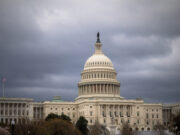The First Amendment protects speech from burdensome government regulation. Until the 1970s, federal law largely did not regulate either campaign speech or issue speech by advocacy groups. That changed with the adoption of the Federal Election Campaign Act. The Act attempted to regulate any speech “relative to a clearly identified candidate.” This law, and the subsequent Supreme Court decision Buckley v. Valeo, drew a line between speech about political issues and speech that was “unambiguously campaign-related.”
Issue speech focuses on public policy. It can urge elected officials and candidates to support or oppose various policies. For example, an environmental group promoting a clean water bill might ask citizens to call on their senators to vote for the legislation. An anti-tax organization promoting lower taxes might run a Facebook ad calling attention to legislation in Congress that would raise taxes. Groups may even criticize lawmakers for failing to support the policies they are promoting. Unlike campaign speech, where fears of corruption allow for some regulation, there is no justifiable reason to regulate issue speech.
Unfortunately, activists that seek to further regulate political speech freedoms often look to regulate issue speech as well. Such regulations violate the First Amendment. Speech about public policy is perhaps the most valuable speech that exists in a democracy. Voters need to hear from as many voices as possible about what their government is doing. Because of its core importance, any law or regulation that limits issue speech is misguided and a threat to the First Amendment.














